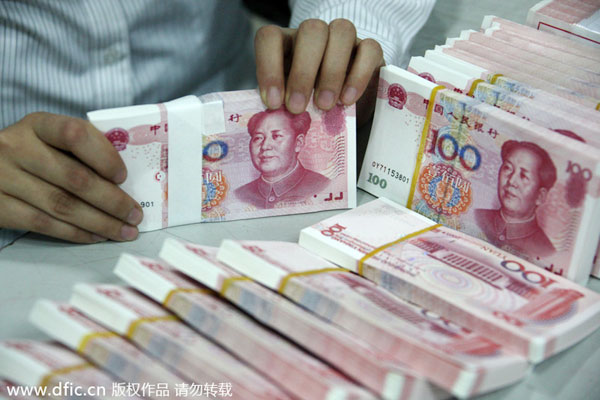 |
|
A clerk counts yuan bills at a bank in Huaibei, East China's Anhui province. [Photo/IC] |
Swapping corporate debt for stock holding is a means instead of radical cure, said Kevin Zhou Jingtong, research head of the macro-economy and policy division of the bank's Institute of International Finance.
"It's difficult for China to push ahead de-stocking, de-capacity and de-leveraging without adaptive measures. And debt-for-equity swap program is an important one," said Zhou at a media briefing.
However, the swaps only bring down the leverage in appearance, and could delay risks to the future, added Zhou on the sideline. "Such pilot program will probably expand, but not on large-scale."
Debt-for-equity swaps should apply to companies with promising prospect but suffering a short-term distress, said the scholar, adding that the practice is common in advanced economies such as Germany, Japan and the US.
Kept at a combined reasonable proportion under careful selection, the swaps can benefit banks' balance sheet and optimize their asset structure in the long run, said Zhou.
The swap has been the country's latest attempt to help banks get rid of bad loans while bolstering indebted companies, as the Ministry of Finance said in a statement earlier this week that the government is taking active measures, including the swaps, to ease debt pressure.
The move came into spotlight after shipbuilding company China Huarong Energy, formerly known as Rongsheng Heavy Industries, became the first one in years to launch a 14.1 billion yuan debt-for-equity swap plan, which would make the BOC its largest shareholder, according to the report. The company's announcement last month gave no details on its bank creditors.
In response to the concerns for equity quality in the swap, Shang Fulin, chairman of the China Banking Regulatory Commission, earlier said it was a complex issue and regulators are studying it.
The BOC projects non-performing loan (NPL) ratio among mainland-listed banks to jump to 2 percent by the year end, from 1.55 percent a year ago, while the provision coverage ratio will drop further to 150 percent, from 175 percent.
The NPL ratio among the country's commercial banks in broader sense rose 0.42 percentage point last year to 1.67 percent, when net profit grew a combined 2.4 percent.
